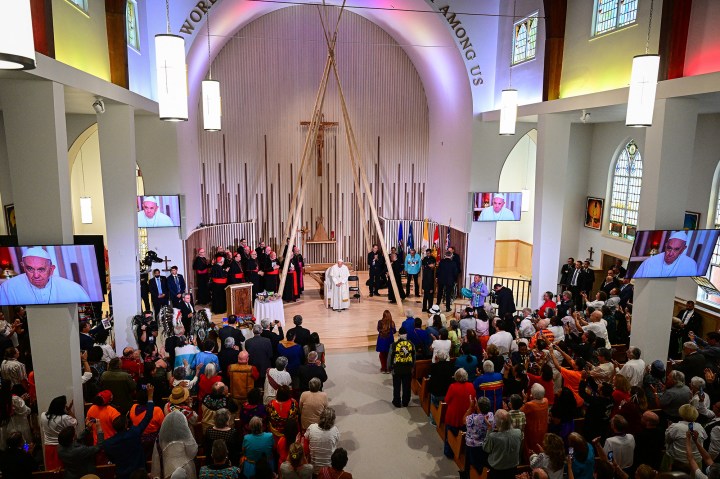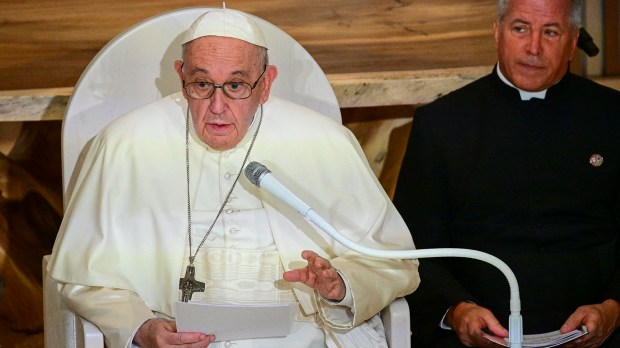Pope Francis met in Edmonton, Canada, with parishioners of the Sacred Heart Church of the First Peoples on July 25, 2022.
The Holy Father offered an insightful reflection on reconciliation, the role of the Church, and how the faith must be shared.
While his address was given in the context of his “penitential pilgrimage” to help heal the wounds caused by residential schools, the ideas apply for any situation that needs reconciliation.
1What does reconciliation mean for us?
Reconciliation. This evening, I would like to share with you some reflections on this word. What does Jesus tell us when he speaks about reconciliation, or when he prompts us towards it? What does reconciliation mean for us today?
Dear friends, the reconciliation brought by Christ was no agreement to preserve outward peace, a sort of gentlemen’s agreement meant to keep everyone happy. Nor was it a peace that dropped down from heaven, imposed from on high, or by assimilating the other.
The Apostle Paul tells us that Jesus reconciles by bringing together, by making two distant groups one: one reality, one soul, one people.
And how does he do that? Through the cross (cf. Eph 2:14). Jesus reconciles us with one another on the cross, on the “tree of life,” as the ancient Christians loved to call it. […]
On the cross, Christ reconciles and brings back together everything that seemed unthinkable and unforgivable; he embraces everyone and everything. Everyone and everything!
2A gift from the crucified Lord
If we truly want to be reconciled with one another and with ourselves, to be reconciled with the past, with wrongs endured and memories wounded, with traumatic experiences that no human consolation can ever heal, our eyes must be lifted to the crucified Jesus; peace must be attained at the altar of his cross.
For it is precisely on the tree of the cross that sorrow is transformed into love, death into life, disappointment into hope, abandonment into fellowship, distance into unity.
Reconciliation is not merely the result of our own efforts; it is a gift that flows from the crucified Lord, a peace that radiates from the heart of Jesus, a grace that must be sought.
3God doesn’t force
There is another aspect of reconciliation that I would like to mention. The Apostle Paul explains that Jesus, by means of the cross, has reconciled us in one body (cf. Eph 2:14). What body is he talking about? He is talking about the body of the Church.
The Church is this living body of reconciliation. If we think of the lasting pain experienced in these places [the residential schools] by so many people within ecclesial institutions, we feel nothing but anger, nothing but shame. That happened because believers became worldly, and rather than fostering reconciliation, they imposed their own cultural models. This attitude, brothers and sisters, dies hard, also from the religious standpoint.
Indeed, it may seem easier to force God on people, rather than letting them draw near to God. This is contradictory andnever works, because that is not how the Lord operates. He does not force us, he does not suppress or overwhelm; instead, he loves, he liberates, he leaves us free.
He does not sustain with his Spirit those who dominate others, who confuse the Gospel of our reconciliation with proselytism. One cannot proclaim God in a way contrary to God himself. And yet, how many times has this happened in history! While God presents himself simply and quietly, we always have the temptation to impose him, and to impose ourselves in his name. It is the worldly temptation to make him come down from the cross and show himself with power. Yet Jesus reconciles us on the cross, not by coming down from the cross.
At the foot of the cross, were those who thought only of themselves and kept tempting Christ, telling him to save himself (cf. Lk 23:35.36) and not think of others. Brothers and sisters, in the name of Jesus, may this never happen again in the Church. May Jesus be preached as he desires, in freedom and charity. In every crucified person whom we meet, may we see not a problem to be solved, but a brother or sister to be loved, the flesh of Christ to be loved. May the Church, the Body of Christ, be a living body of reconciliation!
The word “reconciliation” is in fact practically synonymous with the word “Church.” It comes from the word “council,” and it means “meet again in council.” The Church is the house where we “conciliate” anew, where we meet to start over and to grow together.

4God is here
One final image can help us in this. Here, in this church, above the altar and tabernacle, we see the four poles of a typical Indigenous tent, a teepee. This teepee has deep biblical symbolism. When Israel journeyed in the desert, God dwelt in a tent that was set up every time that the people stopped and camped: it was the Tent of Meeting.
The teepee reminds us that God accompanies us on our journey and loves to meet us together, in assembly, in council. And when he became man, the Gospel tells us, he literally “pitched his tent among us” (cf. Jn 1:14).
God is a God of closeness, and in Jesus he teaches us the language of compassion and tender love. That is what we should call to mind every time that we enter a church, where Jesus is present in the tabernacle, a word that itself originally meant “tent.” Therefore, God has placed his tent in our midst; he accompanies us through our deserts. He does not dwell in heavenly mansions, but in our Church, which he wants to be a house of reconciliation.


